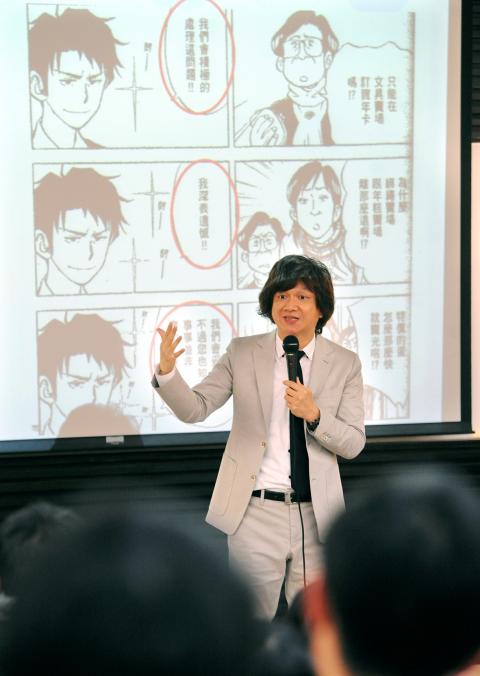A lecturer at one of the nation’s top-ranked universities has been causing a frenzy on campus by using Japanese comic books to teach theories of international politics and economics.
In the course entitled “Using Comics to Explore Japan” at National Chengchi University, Tsai Zheng-jia (蔡增家) teaches 120 students about Japanese politics and economics using slides featuring black and white comic strips.
Due to the course’s popularity, students wishing to get a seat in the classroom have to compete with more than 1,000 peers to sign up for the elective course.

Photo: Liao Chen-huei, Taipei Times
One student only succeeded in registering for the course in his senior year after having been unable to do so for the first three years.
Each class begins with students giving presentations on current affairs from Japan, during which Tsai elaborates on certain points to better inform his students’ about one of the nation’s major allies.
Speaking about his reasons for starting the course, Tsai said that as a specialist in Japan’s political and economic system, as well as international finance, he had attempted in the past to offer courses relevant to his areas of expertise. However, none were well received by students.
“I had a course on Japan’s politics and economy, but less than 20 students took it each semester,” Tsai said, adding that he was disheartened by the course’s unpopularity.
Tsai then thought of his favorite childhood pastime — Japanese manga — and decided to use comics in the classroom to motivate students.
Tsai began the “Using Comics to Explore Japan” course in 2007 and has since sought to teach students about Japan’s politics, educational system and foreign policy through a number of famous Japanese comic books, such as Sanctuary, Kachou Kousaku Shima and Dragon Zakura, among others.
Saying that Japan is one of a few nations that could be understood using comic books, Tsai said that although there are various genres of Japanese manga, several are educational and oriented toward current affairs.
Tsai added that about 13 manga series feature in his four-month course and there are more than 70 comic books listed as reference materials.
However, it is not as easy to pass the course as it might seem.
Tsai conducts a roll call at the beginning of each class, after which students have to offer in-depth analysis of the plots and characters.
Despite the relatively heavy demands of the course, Tsai’s methods have greatly enhanced students’ knowledge and learning.
“Some of the theories that used to be Greek to me when they were in textbooks suddenly make sense now when they are illustrated in comic books,” Tsai quoted one of his students as saying.
Chu Yuan-ting (朱原廷), a junior studying public finance, hailed Tsai’s course, saying that the weekly presentations by students contributed to the lively atmosphere of the course.
“The course has also influenced my choice of comic books. Among Tsai’s recommended books, I found The Star of Prefectural Government particularly interesting and learned that bureaucratic corruption is not only common in Taiwan, but also in Japan,” Chu said.
Tseng Yi-an (曾怡安), a freshman in the Department of Political Science, said she was one of the lucky few that managed to sign up for the course in her freshman year.
“Tsai always teaches in a lighthearted and amusing manner. His lectures and teaching aids have not only allowed me to better grasp Japan’s political and economic system, but have also encouraged me to keep abreast of international news,” Tseng said.
In light of the course’s success, Tsai recently applied similar teaching techniques to a new course, “Movies and International Relations,” which is also extremely popular among students.
In an effort to draw students’ attention toward international relations and shake off stereotypes created by Hollywood movies, Tsai screens an array of international and alternative movies in the class.
“The purpose of teaching is to pass on knowledge to future generations and the key to fulfilling that purpose lies in the tools employed in teaching,” Tsai said.
“Whatever approaches educators use, they must attract students’ attention, before they can eventually instill knowledge in them,” he added.

The Central Weather Administration (CWA) today issued a "tsunami watch" alert after a magnitude 8.7 earthquake struck off the Kamchatka Peninsula in northeastern Russia earlier in the morning. The quake struck off the east coast of the Kamchatka Peninsula at 7:25am (Taiwan time) at a depth of about 19km, the CWA said, citing figures from the Pacific Tsunami Warning Center. The CWA's Seismological Center said preliminary assessments indicate that a tsunami could reach Taiwan's coastal areas by 1:18pm today. The CWA urged residents along the coast to stay alert and take necessary precautions as waves as high as 1m could hit the southeastern

The National Museum of Taiwan Literature is next month to hold an exhibition in Osaka, Japan, showcasing the rich and unique history of Taiwanese folklore and literature. The exhibition, which is to run from Aug. 10 to Aug. 20 at the city’s Central Public Hall, is part of the “We Taiwan” at Expo 2025 series, highlighting Taiwan’s cultural ties with the international community, National Museum of Taiwan Literature director Chen Ying-fang (陳瑩芳) said. Folklore and literature, among Taiwan’s richest cultural heritages, naturally deserve a central place in the global dialogue, Chen said. Taiwan’s folklore would be immediately apparent at the entrance of the

“China is preparing to invade Taiwan,” Deputy Minister of Foreign Affairs Francois Wu (吳志中) said in an exclusive interview with British media channel Sky News for a special report titled, “Is Taiwan ready for a Chinese invasion?” the Ministry of Foreign Affairs said today in a statement. The 25-minute-long special report by Helen Ann-Smith released yesterday saw Sky News travel to Penghu, Taoyuan and Taipei to discuss the possibility of a Chinese invasion and how Taiwan is preparing for an attack. The film observed emergency response drills, interviewed baseball fans at the Taipei Dome on their views of US President

Speeding and badly maintained roads were the main causes of a school bus accident on a rainy day in Taipei last year that severely injured two people and left 22 with minor injuries, the Taiwan Transportation and Safety Board said. On March 11 last year, a Kang Chiao International School bus overturned inside the Wenshan Tunnel (文山隧道) on the northbound lane of the Xinyi Expressway. The tour bus, owned by Long Lai Co, exceeded the speed limit after entering the tunnel, the board’s investigation found. Sensing that the rear of the vehicle was swaying, the driver attempted to use the service and exhaust